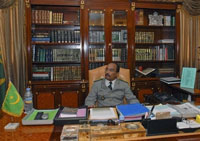Military junta takes power in Mauritania
The military junta that overthrew Mauritania's government last week adopted a law Tuesday transferring the power of the presidency to the head of the junta.

The 11-article law announced in a communique confers the rights of the country's highest office to the army general who led the Aug. 6 coup.
The statement also claimed the coup was brought on by the deteriorating condition of daily life in Mauritania, the president's stonewalling of various government institutions and his firing of the chiefs of the armed forces.
Soldiers detained President Sidi Ould Cheikh Abdallahi hostage, his prime minister and three other high-ranking officials one hour after the president announced the firing of the country's top four generals. Prime Minister Yahya Ould Ahmed Waqef and the three administration officials were released Monday, but the president remains under house arrest.
Addressing a rally of several thousand supporters soon after his release Monday, Waqef said the president is in good health. "The president thanks you for your untiring fight, your strong fight to restore constitutional order," the prime minister told the demonstrators.
In another part of town, demonstrators sang chants of praise for the coup leader.
Businessman Houmey Ould Tangi, one of the organizers of the pro-coup march, called junta leader Gen. Mohamed Ould Abdel Aziz "a hero" who "has made it his habit to pull our country out of gridlock."
The coup came after an increasingly bitter standoff between the army and Abdallahi, who last year won Mauritania's first free-and-fair election in more than two decades. Those elections followed a 2005 coup, which Aziz also helped orchestrate to oust the country's reviled dictator.
Then, the junta announced that it would hold elections and as a gesture of transparency, the 11 leaders of the 2005 coup barred themselves from running in the race.
In an interview Sunday with The Associated Press, Aziz refused to rule out running this time in elections the junta promises to organize.
During his 16 months in office, Abdallahi often clashed with the army leaders, including by opening a dialogue with Islamic militants and by releasing several alleged extremists against the advice of the generals.
The junta has said Abdallahi angered it by being weak on terrorism, but the president's daughter described the coup as a simple power grab.
Aziz had backed Abdallahi during the 2007 elections, believing he would be rewarded with a large say in matters of state, said the daughter, Amal Cheikh Abdallahi.
"They thought my father was malleable, that they could dictate things to him. But my father is a strong and firm man," she said. She also is an official administration spokeswoman.
Subscribe to Pravda.Ru Telegram channel, Facebook, RSS!


